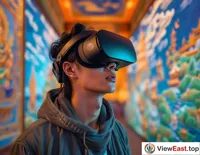







In the wave of digitalization, China is advancing the "Internet Plus" initiative at an unprecedented speed and scale, implementing a digital integration strategy. This strategy is not only a technological innovation but also a profound transformation involving all fields of economy, culture, and society.
1. The Leapfrog Development of Digital Infrastructure
China has made significant achievements in the construction of digital infrastructure. The 4G network covers the whole country, and the number of 5G base stations leads the world, providing a solid foundation for the digital economy. At the same time, China has built the world's largest fiber optic network, achieving broadband network coverage in all administrative villages, providing strong support for the implementation of the digital integration strategy.
2. Accelerated Release of Data Resource Value
Data has become an important factor of production in the new era. China's data output ranks second in the world, and the scale of the big data industry is growing rapidly, providing abundant resources for the development of the digital economy. By promoting the opening of public data and the utilization of commercial data, China is accelerating the release of the value of data resources and promoting high-quality economic development.
3. The Booming Development of the Digital Economy
China's digital economy scale is second only to the United States, accounting for nearly 40% of the gross domestic product. New models and formats such as e-commerce and mobile payments continue to emerge, injecting new momentum into economic development. At the same time, the deep integration of digital technology and the real economy has promoted the transformation and upgrading of traditional industries, improving production efficiency and product quality.
4. The Significant Effects of Digital Government Construction
China has also achieved significant results in the construction of digital government. The electronic government service index has risen globally, and the level of digitalization and intelligence of government services has been significantly improved. Through "Internet Plus Government Services," "one network handling" and "cross-province handling" have been realized, greatly facilitating the public and enterprises, and improving the efficiency and quality of government services.
5. The Digital Cultural Construction Reaching New Levels
In the field of culture, China has promoted the creative transformation and innovative development of culture through digital technology. For example, through virtual reality technology, users can immerse themselves in cultural heritage, such as the 3D models of Dunhuang murals. This "digital + culture" integration not only rejuvenates traditional culture but also opens up new space for the development of the cultural industry.
6. Precise and Inclusive Digital Social Construction
China has also made positive progress in the construction of digital society. Through digital means, the inclusiveness and convenience of public services have been improved. For example, through online education platforms, children in remote areas can also enjoy high-quality educational resources; through remote medical services, grassroots people can also obtain professional medical consultations and treatments.
In summary
The achievements China has made in the digital integration strategy reflect the country's high regard and strong promotion of digital transformation. By strengthening the construction of digital infrastructure, utilizing data resources, developing the digital economy, constructing digital government, innovating digital culture, and digitizing social services, China is building a more intelligent, efficient, and inclusive digital society. These achievements not only promote high-quality economic development but also greatly improve the quality of life for the people, providing Chinese experience and solutions for global digital development.